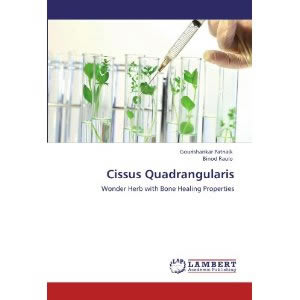Cissus quadrangularis (devil’s backbone) is a perennial plant of the grape family. Also known as Veld Grape, it has been used for centuries as a traditional tonic for a different health problems. The leaves and stems are indicated as the main sources for C. quadrangularis healing and restorative activities. Lab experiments and research in animal-based, demonstrate that it has antioxidant, anti-inflammatory, and analgesic effects. C. quadrangularis includes plant steroids named ketosterones, which accelerate bone healing by acting as glucocorticoid antagonists.
Cissus quadrangularis Benefits
 This plant helps to speed recovery from bone fracture, relieve gastric problems, as an anti-inflammatory and an analgesic. Recent researches has shown the effect of Cissus to speed up bone healing by acting as a glucocorticoid receptor antagonist.
This plant helps to speed recovery from bone fracture, relieve gastric problems, as an anti-inflammatory and an analgesic. Recent researches has shown the effect of Cissus to speed up bone healing by acting as a glucocorticoid receptor antagonist.
Researches has focused on C. quadrangularis capability to speed bone healing by showing it acts as a glucocorticoid antagonist. Since anabolic and androgenic substances are well known to effect as antagonists to the glucocorticoid receptor promote bone growth and fracture healing, it has been postulated that Cissus quadrangularis possesses anabolic and androgenic activities.
C. quadrangularis is the frequently used effective Ayurvedic remedy for the purpose of bone fractures. In clinical studies, C. quadrangularis has led to a fracture healing time in the order of 55 to 33% of that of controls. C. quadrangularis extract, in vitro, has been to boost Insulin-Like Growth Factor signalling in bone cells treated with Cissus. In vitro other study found that, cissus quadrangularis extract was able to induce stem cell production into osteoblasts. A study was undertaken to analyze the effect of methanolic extract of Cissus on the healing process of experimentally fractured radius-ulna of dog. Cissus quadrangularis treated animals revealed faster initiation of healing process than the control animals on radiological and histopathological examinations. Improvement was nearly complete on 21st day of fracture in the treated animals and remained incomplete in the control animals.
Developing research demonstrate that taking a specific Cissus quadrangularis combination product (Cylaris or CQR-300) decreases weight in obese and overweight people. A weight loss supplement (Cylaris) containing Cissus quadrangularis and other ingredients including soy albumin, green tea, niacin-bound chromium, selenium, and vitamins B-6 and B-12, and folic acid was evaluated in an 8-week study. The supplement helped decrease body weight by 4-8% a clinically noteworthy weight loss. (2.4% in the placebo group)
Scientific researches have shown Cissus relieve ulcers by strengthening the gastric mucosa, the stomach’s protective lining. The ulcer-protective effect of a methanolic extract of C. quadrangularis was comparable to that of the reference medication sucralfate. Some of the non-steroidal anti-inflammatory medications including aspirin reason gastric ulcer. The experimental results suggests that Cissus quadrangularis promotes ulcer protection by the reduce in ulcer index, gastric secretions and increase in the glycoprotein level, gastric mucin content and NPSH (non-protein sulfhydryls) concentration. In addition, gastric juice and mucosal studies demonstrated that Cissus at a dose of 500 mg/kg given for ten days significantly increased the mucosal defensive factors like mucin secretion, mucosal cell proliferation, glycoproteins and life span of cells.
Dosage
The recommended daily dosage of C. quadrangularis extract is between 100 and 500 milligrams. Cissus extract can safely be taken in dosages of up to 500 milligrams per day.
Cissus quadrangularis Side Effects
Animal toxicological experiments demonstrate that no signs of toxicity or adverse effects were observed in rats fed up to 2500 milligrams Cissus extract/kg body weight/day for 90 days. This amount, is the equivalent of 200 g for an 80 kg man. However, some people have reported insomnia, headache and diarrhea with long-term use of Cissus extract .
Leave a Reply